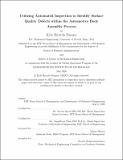Utilizing automated inspection to identify surface quality defects within the automotive body assembly process
Author(s)
Danner, Kyle Ricardo.
Download1191622665-MIT.pdf (18.02Mb)
Other Contributors
Sloan School of Management.
Massachusetts Institute of Technology. Department of Mechanical Engineering.
Leaders for Global Operations Program.
Advisor
Steven Spear and Jung-Hoon Chun.
Terms of use
Metadata
Show full item recordAbstract
Nissan relies on inspectors to perform manual inspections in order to ensure vehicles are produced with a high-quality surface finish. These inspections occur throughout the vehicle assembly process and are meant to identify surface quality defects as well as determine at which major step in the vehicle assembly process the defect originated. An issue of uncertainty arises because inspectors routinely identify defects on completed vehicles and then deem the Body Assembly Shop, an upstream process, as responsible for creating the defect. However, inspectors in the Body Assembly Shop have already evaluated the vehicle and guaranteed it to be defect free. This indicates that inspectors in the Body Assembly Shop are failing to identify defects or inspectors at the end of the process are misidentifying the vehicle assembly process in which the defect originated. The objective of this project is to determine the effectiveness of an automated solution for inspecting vehicles in the Body Assembly Shop. Our approach was to first understand the basic physics underlying the chosen automated solution, the ZEISS ABIS II sensor, in order to understand its limitations when identifying a defect. We tested the ABIS II sensor on a replication of the Nissan production line in order to determine the sensor performance in identifying defects relative to Nissan requirements. A scaled-down version of testing was also completed on the actual Nissan production line so as to determine the impact on performance due to variation induced by the moving line and vehicle assembly processes. Overall, we found that the ABIS II sensor is able to identify surface quality defects consistent with the characteristics described by Nissan's standards. In fact, the lower limit of defect size identified by the ABIS II sensor is smaller than Nissan typically refers to as a defect. Additionally, we identified changes to Nissan's existing processes as well as new feedback loops that can be used to validate or refute defect responsibility assignments. Changes to existing processes include letting surface quality defects pass through the painting process in order to fine tune the automated inspection limits in the Body Assembly Shop. We also identified the possibility of using automated surface quality inspection data to validate or refute the defect responsibility assignment that is determined at the end of the assembly process. Using downstream manual inspections to fine tune the automated inspection in an iterative manner can lead to effectively shortening the closed loop feedback process so that defects are contained and repaired in the Body Assembly Shop.
Description
Thesis: M.B.A., Massachusetts Institute of Technology, Sloan School of Management, in conjunction with the Leaders for Global Operations Program at MIT, May, 2020 Thesis: S.M., Massachusetts Institute of Technology, Department of Mechanical Engineering, in conjunction with the Leaders for Global Operations Program at MIT, May, 2020 Cataloged from the official PDF of thesis. Includes bibliographical references (pages 111-112).
Date issued
2020Department
Sloan School of Management; Massachusetts Institute of Technology. Department of Mechanical Engineering; Leaders for Global Operations ProgramPublisher
Massachusetts Institute of Technology
Keywords
Sloan School of Management., Mechanical Engineering., Leaders for Global Operations Program.